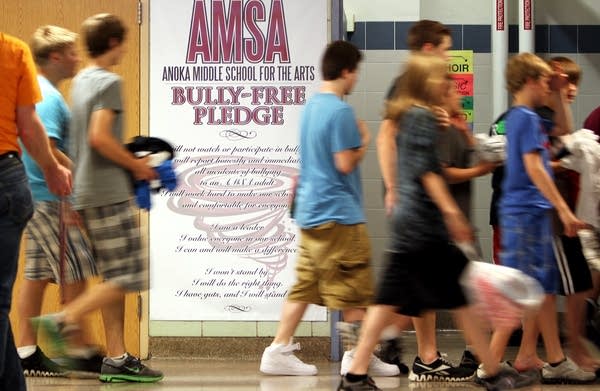Some teachers conflicted over Anoka-Hennepin's sexual orientation policy
Go Deeper.
Create an account or log in to save stories.
Like this?
Thanks for liking this story! We have added it to a list of your favorite stories.

On paper, a policy in Minnesota's largest school district says that it's not a teacher's job to explain what it means to be gay. Moreover, it states they must remain neutral if the subject comes up in class. In practice, though, that policy is being interpreted a variety of ways.
Some teachers in the Anoka-Hennepin School District say the policy lacks clarity and makes it easy for discrimination to seep into school hallways. For others, the policy is perfectly clear.
The lack of consensus about the so-called "neutrality policy" comes as school officials defend it against the threat of a lawsuit by two national civil rights organizations. Officials will meet next week with representatives from the Southern Poverty Law Center and National Center for Lesbian Rights, putting the school district in the national spotlight for its handling of issues affecting gay, lesbian, bisexual and transgender students.
The national groups argue that keeping sexual orientation discussions out of the classroom contributes to a hostile atmosphere for gay students because it prevents teachers from validating students' identity and denies teachers the ability to support them. That atmosphere can lead to bullying, they said. School district officials say the policy is intended to give church and families — not teachers — the strongest voice on the topic.
Turn Up Your Support
MPR News helps you turn down the noise and build shared understanding. Turn up your support for this public resource and keep trusted journalism accessible to all.
It's been a traumatic past two years in the district serving 13 northern Twin Cities suburbs in a conservative part of the state. At least seven students in the district have committed suicide during that time. Parents and school officials have been at odds over how many of them were gay and whether bullying played a role.
In a letter last month, the groups asked the district to get rid of what they call a "gag policy," which has been in place for two years. During that time, the policy, which appears to be unique in Minnesota, has had an impact on everything from school clubs to history projects to class discussions. Nationally, eight states have laws limiting what teaches can say about homosexuality.
Many of the more than a dozen current and former Anoka-Hennepin teachers interviewed by MPR News had questions about how the policy applies to certain situations. The district's teachers' union president, Julie Blaha, said the union is asking district officials to clarify the policy.
"If you ask five different teachers how this policy works, you get five different answers," Blaha said. "People want to make sure they're treating all kids fairly and creating an environment where they'll be successful — every single one of them. How to do it ... is more challenging.
Blaha, who taught at Jackson Middle School in Champlin before becoming the union president last year, said she once hesitated before responding to one of her students being called a derogatory, anti-gay term in class. She knew that the students involved came from families with opposite views on the issue and worried whether administrators would support her actions.
"If I, at that time the vice president of the teacher's union, is hesitating out of bit of fear over what kind of support I'm going to have, I can only imagine how other teachers are reacting," she said. "That suggests that this policy is getting in the way at some level."
The union is gathering more information about the policy and impact it's having in teachers' classrooms before taking a position on how the district should respond, Blaha said.

Superintendent Dennis Carlson defended the policy in an op-ed MPR News published this week, saying the policy aims to foster respect for all students and families, including those who believe homes and churches — not schools — should handle sexual orientation discussions.
"Providing policies and programs that reflect a divided community is difficult," Carlson wrote. "Wishing to respect all families and all students, the school board believes neutrality is the best option." Carlson pointed out that the neutrality policy is separate from the district's bullying and harassment policies.
School board member John Hoffman said those criticizing the policy need to consider how it came about. When the board adopted the policy in February 2009, they were working to change an archaic school board directive from 1995 that said homosexuality would "not be taught/addressed as a normal, valid lifestyle" in the health curriculum taught in Anoka-Hennepin schools.
"It expanded beyond that and became broader, and there was a lot of misinterpretation going on," Hoffman said of the 1995 language. "We wanted to make sure we were being consistent with state and federal law but also wanted to give some clear direction."
The school district is in a conservative area of the state. In 2010, voters in the district chose Republicans over Democrats by at least a 12-point margin in races for governor and the Legislature. In 2008, Republican John McCain beat Democrat Barack Obama in the district; statewide, Obama won by a 10-point margin
Hoffman said there might come a time when the policy is no longer needed in the Anoka-Hennepin district. For now, it has a purpose, he said.
"If it's factual and important and part of the discussion, then there should not be a problem. That's different than saying, 'I'm going to advocate on one side of the discussion,'" he said. "That pulls you back from your role as a teacher and you become an advocate."
Teachers in the district agreed that forcing personal opinions on their students was inappropriate and could even be considered unethical. But many said the policy allows for too much gray area.
Ann Lindsey, a teacher at Jackson Middle School, said teachers haven't been given the tools needed to fully address bullying and harassment of gay students. Simply scolding a student for saying "faggot" or "that's so gay" isn't enough, she said.
"It's always after the fact," said Lindsey, who advises a Gay-Straight Alliance student group at her school. "We need to start addressing it before the harassment starts."
Not everyone sees a link between the "neutrality policy" and bullying. While the policy limits what a teacher can teach, the district "has made it abundantly clear" that the policy does not limit a teacher's ability to support all students, including those who have been bullied for their sexual orientation, said Brent Munce, a school psychologist at Coon Rapids High School.
"I have met with all kinds of students," Munce said. "My focus is not on political controversies — my focus is on addressing their mental health needs."
Bullying issues aside, teachers said the sexual orientation policy can affect routine duties in classrooms across the district. An elementary school teacher, who requested anonymity, said for her the policy means being sensitive to the fact that a student might have two moms or two dads when communicating with students and their parents.
A high school teacher leading a class for nursing assistants said it means teaching students that a patient's sexual orientation shouldn't affect the way he or she is treated. "Kids completely understood and had no problem with it," said Mishele Cunningham, a former Anoka-Hennepin nursing teacher.
Though Cunningham left the district to return to a nursing job before the policy was fully implemented, she said she has no doubts her teaching aligned with it.
"Teachers should be teaching a neutral stance," said Cunningham, who has a high school son in the district. "That's how everyone should be treated anyway — with respect."
For a high school social studies teacher, who asked not to be identified, the policy prompted consultation with administrators before allowing students to study a court case about a gay-rights group as part of a history lesson. In that case, administrators determined it was relevant.
In a case at a middle school, administrators questioned whether a discussion of historical figures' sexual orientation was factual because they didn't disclose their sexual orientation during their lifetime. That frustrated Jefferson Fietek, who teaches theater at Anoka Middle School for the Arts. He said omitting that kind of discussion from history can make gay students feel excluded.
"The thing that is so heartbreaking for me is to hear kids who come and say, 'I'm the only one who feels this way, I'm the only one that's been through this, there's nobody like me.' And you sit there and think, 'Actually, there's lots and lots of people like you but you're not seeing that,'" he said.



